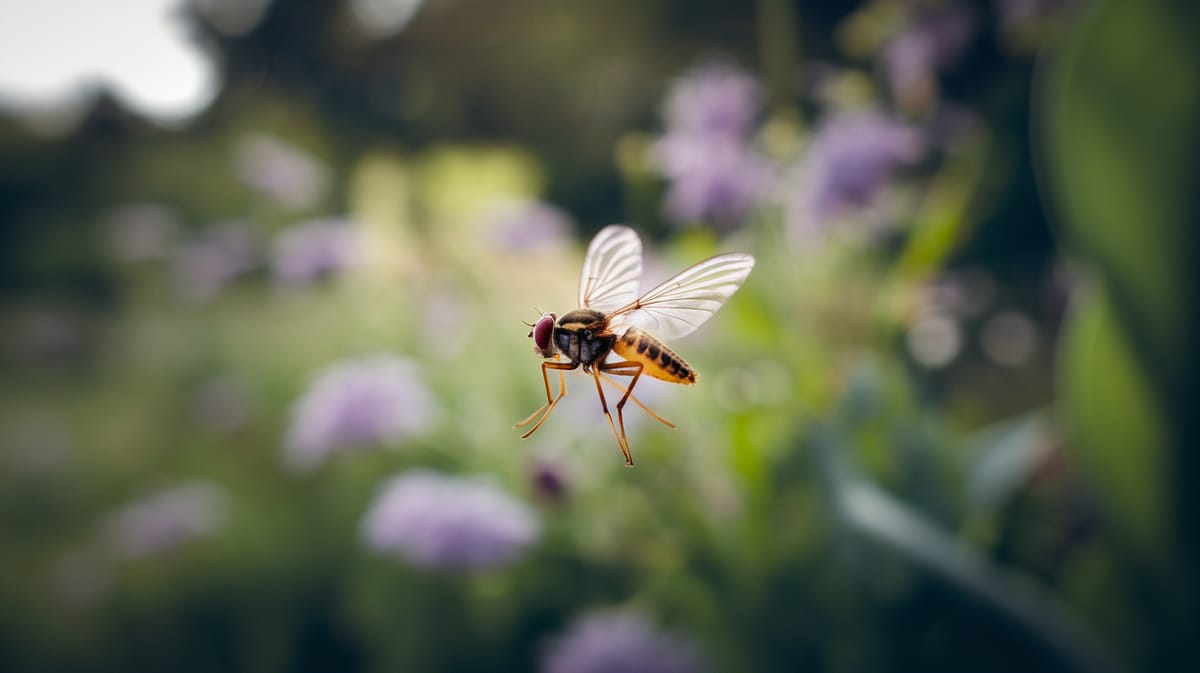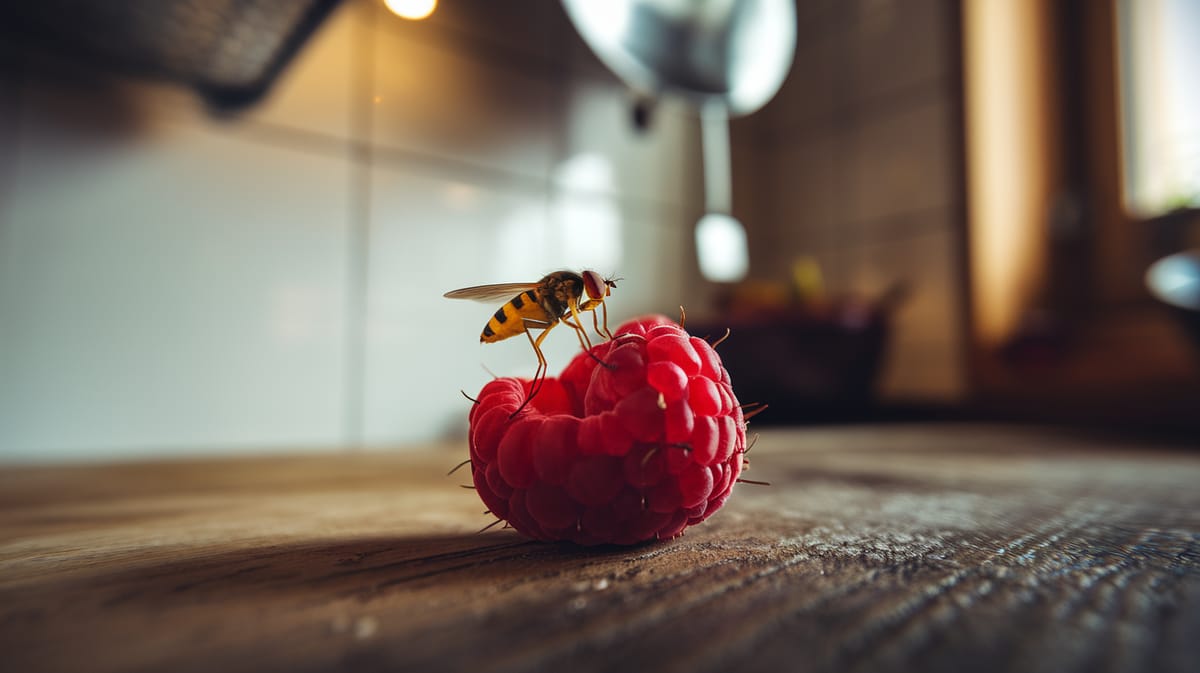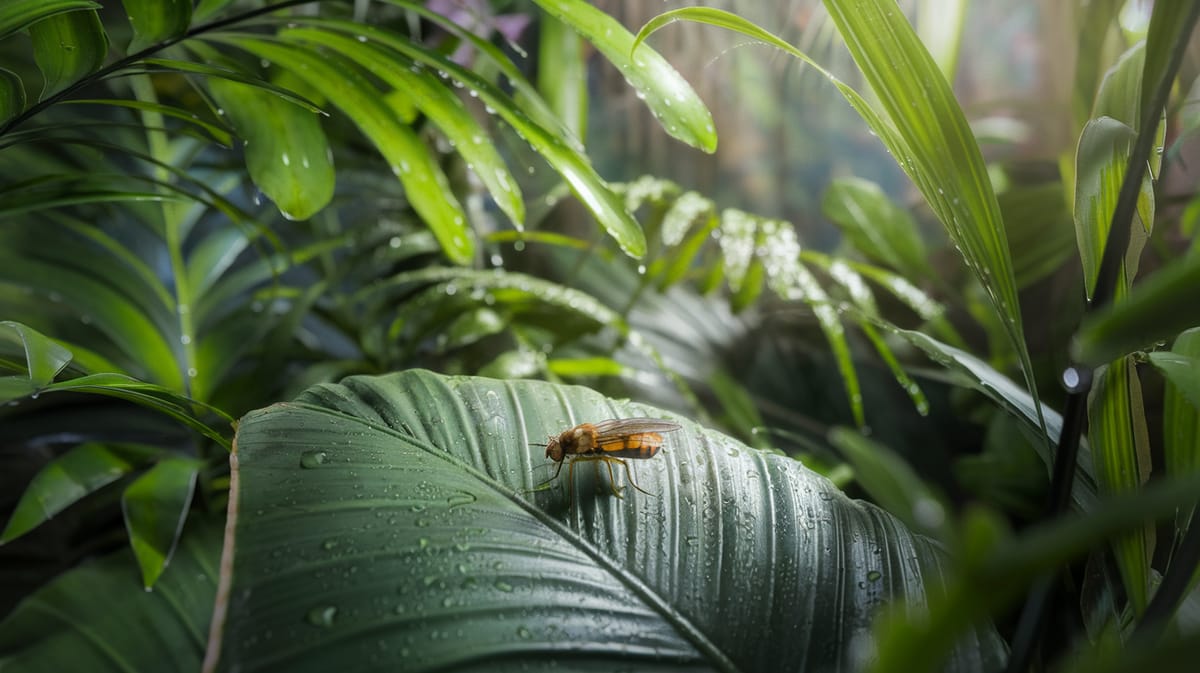Drosophila Fly
Tiny yet mighty, the Drosophila Fly is a geneticist's dream, offering insights into evolution and development. Its rapid life cycle and adaptability make it a staple in laboratories worldwide.

Key Insights at a Glance
Did You Know?
Taxonomy & Classification
Drosophila flies, known for their rapid life cycles and genetic versatility, have become essential models in biological research, significantly contributing to our understanding of genetics and evolution. Let's understand the evolutionary journey and classification of these remarkable decomposers.
Global Presence
With over 1,500 species, Drosophila flies inhabit diverse habitats worldwide, from tropical rainforests to temperate regions.
Evolutionary Success
Originating over 40 million years ago, Drosophila has thrived due to its adaptability and genetic diversity, surviving significant climatic shifts.
Lifecycle and Growth
A remarkable journey of transformation from Egg to Adult.
Egg
Tiny, oval eggs are laid on fruit surfaces, initiating development through rapid cellular division within hours.
Larva
Feeding intensively, larvae grow by consuming decaying matter, undergoing three molts to increase in size.
Pupa
Encased in a hardened shell, pupae undergo metamorphosis, reconfiguring internal structures to form adult features.
Adult
Fully developed adults emerge, ready to mate and lay eggs, completing the lifecycle efficiently.
Dietary Habits
A versatile feeder with impressive adaptability, this insect thrives on fermenting fruits, yeast, and opportunistic food sources.
| DIET TYPE | DESCRIPTION |
|---|---|
| Primary Diet | Primarily feeds on fermenting fruits, especially bananas and apples, using its specialized mouthparts to extract nutrients. |
| Secondary Diet | Also consumes yeast and bacteria from decaying plant material, contributing to its diverse dietary intake. |
| Occasional | Occasionally feeds on waste from food sources in human environments, taking advantage of available organic matter. |

Behaviour and Adaptations
Discover the fascinating traits that make the Drosophila Fly a model organism and evolutionary marvel.
Rapid Reproduction
Drosophila flies reproduce quickly, allowing for swift population growth and genetic studies.
Sensory Acuity
Highly sensitive olfactory receptors detect subtle chemical cues in the environment.
Learning Ability
Capable of associative learning, adapting behaviors based on past experiences.
Ecosystem Impact
Contributing to ecological stability through nutrient cycling and food webs.
Nutrient Recycling
Aids in decomposing organic matter, enriching soil health and fertility.
Food Source
Serves as prey for birds, amphibians, and other insects.
Pollinator Support
Plays a minor role in pollination, aiding plant reproduction.
Conservation Challenges
Protecting the delicate balance of Drosophila Fly ecosystems is crucial to their survival.
Habitat Degradation
Urban development reduces available habitats for Drosophila species.
Chemical Pesticides
Widespread pesticide use harms Drosophila populations and disrupts ecosystems.
Climate Variability
Fluctuating temperatures and weather patterns affect Drosophila breeding cycles.
Frequently Asked Questions
How long do Drosophila Fly live?
Drosophila flies, commonly known as fruit flies, typically live for about 30 to 50 days under optimal conditions. Their lifespan can be influenced by temperature, availability of food, and environmental factors. In laboratory settings, they are often studied due to their short lifespan and rapid reproduction.
What do Drosophila Fly eat?
Drosophila flies primarily feed on fermenting fruit and other decaying plant matter. They are attracted to the yeast and bacteria found on rotting produce. In laboratory settings, they are usually fed a diet of yeast, sugar, and cornmeal.
Are Drosophila Fly poisonous?
Drosophila flies are not poisonous. They do not pose any significant health risks to humans or animals. They are mostly considered a nuisance when they infest homes or food storage areas due to their attraction to overripe or fermenting fruit.
Are Drosophila Fly endangered?
Drosophila flies are not endangered. They are one of the most widely distributed and abundant insect species worldwide. While some specific species within the Drosophila genus may be rare, the common fruit fly species is not at risk.
What do Drosophila Fly symbolize?
Drosophila flies often symbolize transformation and adaptation due to their rapid life cycle and ability to thrive in various environments. In scientific research, they are a symbol of genetic study because of their simple genome and the ease with which they can be bred in large numbers.
Do Drosophila Fly bite?
Drosophila flies do not bite humans or animals. They lack the mouthparts necessary to pierce skin. Their primary interest is in feeding on fermenting fruits and vegetables, where they obtain both their food and moisture needs.
What color are Drosophila Fly?
Drosophila flies are typically light brown or tan with distinctive red eyes. Their wings are clear with visible veins. The small size and the bright red eyes are often key identifying features of these common fruit flies.
Does a Drosophila Fly have wings?
Yes, Drosophila flies have wings. These wings are crucial for their mobility, allowing them to travel short distances in search of food sources. The wings are clear and relatively large compared to their small body size.
What does a Drosophila Fly look like?
Drosophila flies are small, about 3-4 mm in length, with a tan body and bright red eyes. They have six legs and a pair of clear wings. Their small size and rapid movement make them easily recognizable in kitchens and food storage areas.
Is a Drosophila Fly an insect?
Yes, a Drosophila fly is an insect. It belongs to the order Diptera, which includes all true flies. Like other insects, it has a segmented body with a head, thorax, and abdomen, six legs, and one pair of wings.
Related Insects
Discover insects with similar characteristics to Drosophila Fly - including shared habitats, diets, and taxonomic classifications
Share this profile
Help others discover Drosophila Fly
